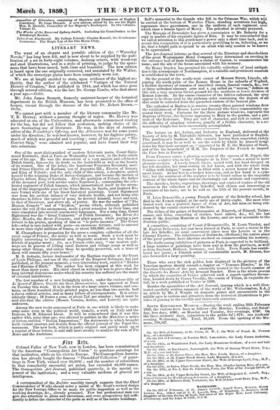LITERARY NEWS.
The want of an elegant and portable edition of the " Waverley Novels," has long been felt, and is now about to be supplied by the pub- lication of a set in forty-eight volumes, foolscap octavo, with wood-out and steel illustrations, and in a style of printing, to judge by the speci- mens that have been issued, both clear and beautiful. The new edition is based upon the one originally corrected, and annotated by Sir Walter, of which the stereotype plates have been completely worn out.
-We are at length enabled to state, upon evidence of the highest au- thority, that the author of the celebrated " Vestiges of the Natural History of Creation," first published in 1844, and which has since gone through several editions, was the late Dr. George Combs, who died about a year ago.—Critic.
Mr. John James Bennett, formerly assistant-keeper of the botanical department in the British Museum, has -been promoted to the office of keeper, vacant through the decease of the late Dr. Robert Brown.— Critic.
We cannot part with a member of the literary community like Mr. T. K. Hervey, without a passing thought of regret. Mr. Hervey was educated at one of the Universities, and afterwards commenced reading for the bar, but did not follow that profession, making choice of the more fascinating one of literature. He was, in the days of Annuals, editor of the _Friendship's Offering, and the Athenemon was for some years under his direction ; he was best known, however, by his fugitive poetry, much of which was graceful and touching ; some of his pieces, as "The Convict Ship," were admired and popular, and have found their way into selections.
One of the most distinguished of modern Sclavonic poets, Count Sigis- mund Krasinski, died at Paris on Wednesday last week, in the forty-ninth year of his age. He was the descendant of a very ancient and celebrated Polish family, famous for its deeds on the battlefield as well as the beauty of its women. One of the latter, the handsome Francisca Krasinski, mar- ried Prince Charles of Kurland, son of Augustus III., Elector of Saxony and King of Poland ; and the only child of this union, a daughter, united herself to the reigning Duke of Savoy-Carignan, and became the mother of Charles Albert, King of Sardinia. After the partition of Poland, the father of the deceased poet, took service under Napoleon I. commanding the cele- brated regiment of Polish hussars, which immortalized itself by the storm- ing of the impregnable pass of the Somo Sierra, in Spain, and inspired Ho- race Vernet with one of his finest historical paintings. Count Sigismund was from his earliest infancy of very delicate health, and not being able therefore to follow the career of arms, he devoted himself, heart and soul, to that of literature, and above all, of poetry. He was the author of "The Human Comedy" and of "Irydion," poems which, although published under the veil of the anonymous, made a great sensation in their time, and were translated into several continental languages. For a long time Count Sigismund was the " Great Unknown" of Polish literature ; the Revue des _Deux Mondes, the Revue Francaise, and other papers, while paying a just tribute to his genius, speaking of him as "le poste inconnu." The Count left—what is rare indeed with poets—an enormous fortune, said to amount to more than eight millions of francs, or about 320,0001. sterling.
M. Champfieury is preparing for the press a complete collection of all the rural songs of France, the music as well as words. Such a work must be highly interesting to historical and linguistic students not less than to friends of popular music ; for, as a French critic says, " our modern rail- ways are in process of killing rural dialects and village songs as well as many other things, and unless these be speedily preserved, not a trace of them will remain fifty years hence."
M. B. Ardouin, former Ambassador of the Haytian republic at the Court of Louis Philippe, and one of the exiles of the Emperor Solouque, has just published, at the present moment, a very interesting work, entitled "Etudes aur l'Histoire The author has been engaged at this work for more than three years. His chief object in writing it was to prove that the long internal dissensions nnderwhich his country has suffered are the result of external interference.
The first number of a new fortnightly review, under the curious title of Le Quart-d'Heure, Gazette des Gens .Demi-serieux, has appeared at Paris on Tuesday this week. It is in the form of a large octavo volume, and con- tains, on three hundred closely-printed pages, no less than two novels, half a dozen critical articles, and as many letters of correspondents. It is aston- ishingly cheap ; 18 francs a year, or about 7fd. per number ; but it must be said also that the editors (Messrs. Verities, Astrue, and Louvet) are quite unknown.
Among the new books announced at Paris is one which is likely to make some noise even in the political world, namely, a work on Italy and the Italians, by M. Edmond About. It will be remembered that it was this author who, some time ago, was allowed to publish in the Moniteur a series of letters entitled " Italian Impressions," the statements in which brought forth violent answers and denials from the official journal of the Papal Go- vernment. The new book, which is partly original and partly made up of a reprint of these letters, is said still more sternly to analyze the rule of Pio Nono and the Austrians.


























 Previous page
Previous page